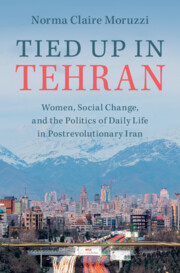Book contents
- Tied Up in Tehran
- Tied Up in Tehran
- Copyright page
- Contents
- Acknowledgments
- Tables
- Preface
- 1 Introduction: The Personal Is Political – How I Came to Write This Book
- 2 Tied Up in Tehran: A Metaphor
- 3 How Our Mothers Drive Us Crazy: Hospitality, Ritual, and the Burden of the Social
- 4 Food as a Social Relation: Sabzi and the Question of Household Skilled Labor
- 5 Elegy or The Rule of the Fathers: The Break with the Past
- 6 Democratic Intimacies: Jokes, Sex, and Ta’arof
- 7 Through the Looking Glass: Reflexive Cinema and Society in Postrevolutionary Iran
- 8 Women, Life, Freedom: One Movement out of Two Legacies
- 9 Being a Public Woman: Streets, Cars, Crimes, and the Shifting Calculus of Moral Accountability
- 10 Shopping for Shoes: Consumer Identity, Commodity Fetishism, and Gender as a Brand
- 11 We Are More Than One, When We Speak Together: Collective Art, Plural Possibilities, and the Horizon of Utopia
- 12 Coda: Thinking in Practice – Arendt, Foucault, and the Challenge of Freedom
- Bibliography
- Index
12 - Coda: Thinking in Practice – Arendt, Foucault, and the Challenge of Freedom
Published online by Cambridge University Press: 28 September 2025
- Tied Up in Tehran
- Tied Up in Tehran
- Copyright page
- Contents
- Acknowledgments
- Tables
- Preface
- 1 Introduction: The Personal Is Political – How I Came to Write This Book
- 2 Tied Up in Tehran: A Metaphor
- 3 How Our Mothers Drive Us Crazy: Hospitality, Ritual, and the Burden of the Social
- 4 Food as a Social Relation: Sabzi and the Question of Household Skilled Labor
- 5 Elegy or The Rule of the Fathers: The Break with the Past
- 6 Democratic Intimacies: Jokes, Sex, and Ta’arof
- 7 Through the Looking Glass: Reflexive Cinema and Society in Postrevolutionary Iran
- 8 Women, Life, Freedom: One Movement out of Two Legacies
- 9 Being a Public Woman: Streets, Cars, Crimes, and the Shifting Calculus of Moral Accountability
- 10 Shopping for Shoes: Consumer Identity, Commodity Fetishism, and Gender as a Brand
- 11 We Are More Than One, When We Speak Together: Collective Art, Plural Possibilities, and the Horizon of Utopia
- 12 Coda: Thinking in Practice – Arendt, Foucault, and the Challenge of Freedom
- Bibliography
- Index
Summary
A theoretical intervention into the challenge of thinking through the complexities of life, in Iran or elsewhere. Hannah Arendt and Michel Foucault offer us a model of thinking as a practice. Each attempted one project in which they were thinking systematically about ongoing events, and offering that thinking as a contribution to public understanding. Arendt traveled to Jerusalem to observe the Adolf Eichmann trial, and her contemporaneous writing was published in The New Yorker magazine. Foucault traveled to Iran to observe the early stages of the revolution, and his contemporaneous writing was published (mostly) in the Corriere della Sera newspaper. These two projects have commonly been regarded as their author’s most controversial and have often been ignored or used to denigrate the writer’s entire theoretical oeuvre. Yet they offer compelling models of thinking as a practice that critically links the self and the world. Rescuing theory from the confines of academic specialization restores it, and us, to the possibility of thinking as a practice of freedom, and freedom as the daily possibility of beginning anew.
Keywords
Information
- Type
- Chapter
- Information
- Tied Up in TehranWomen, Social Change, and the Politics of Daily Life in Postrevolutionary Iran, pp. 317 - 330Publisher: Cambridge University PressPrint publication year: 2025
Accessibility standard: WCAG 2.2 AAA
Why this information is here
This section outlines the accessibility features of this content - including support for screen readers, full keyboard navigation and high-contrast display options. This may not be relevant for you.Accessibility Information
Content Navigation
Allows you to navigate directly to chapters, sections, or non‐text items through a linked table of contents, reducing the need for extensive scrolling.
Provides an interactive index, letting you go straight to where a term or subject appears in the text without manual searching.
Reading Order & Textual Equivalents
You will encounter all content (including footnotes, captions, etc.) in a clear, sequential flow, making it easier to follow with assistive tools like screen readers.
You get concise descriptions (for images, charts, or media clips), ensuring you do not miss crucial information when visual or audio elements are not accessible.
Visual Accessibility
You will still understand key ideas or prompts without relying solely on colour, which is especially helpful if you have colour vision deficiencies.
You benefit from high‐contrast text, which improves legibility if you have low vision or if you are reading in less‐than‐ideal lighting conditions.
